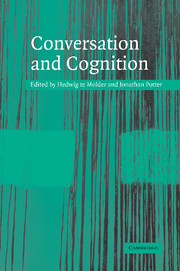Book contents
- Frontmatter
- Contents
- List of contributors
- Acknowledgements
- Transcription conventions
- 1 Talking cognition: mapping and making the terrain
- Part I The interface between cognition and action
- 2 Validating ‘observations’ in discourse studies: a methodological reason for attention to cognition
- 3 Language without mind
- 4 Using participants' video-stimulated comments to complement analyses of interactional practices
- 5 From paradigm to prototype and back again: interactive aspects of ‘cognitive processing’ in standardized survey interviews
- 6 A cognitive agnostic in conversation analysis: when do strategies affect spoken interaction?
- Part II Cognition in action
- References
- Index
3 - Language without mind
Published online by Cambridge University Press: 22 September 2009
- Frontmatter
- Contents
- List of contributors
- Acknowledgements
- Transcription conventions
- 1 Talking cognition: mapping and making the terrain
- Part I The interface between cognition and action
- 2 Validating ‘observations’ in discourse studies: a methodological reason for attention to cognition
- 3 Language without mind
- 4 Using participants' video-stimulated comments to complement analyses of interactional practices
- 5 From paradigm to prototype and back again: interactive aspects of ‘cognitive processing’ in standardized survey interviews
- 6 A cognitive agnostic in conversation analysis: when do strategies affect spoken interaction?
- Part II Cognition in action
- References
- Index
Summary
Introduction
‘Language is dependent on mind’ – so says John Searle (1983: 161), and he certainly speaks with the contemporary philosophical consensus in the United States and elsewhere. Indeed, such a conception of the human capacity for language extends back at least to Aristotle's De Interpretatione, to Descartes, and can be found also in Locke, de Saussure, Chomsky, Fodor and many others. Animal cognition studies, whilst ostensibly mounting a challenge to such a conception, have nonetheless frequently been framed within the terms of just this conception, the key issue being formulated as: to what extent can creatures without minds successfully and productively manipulate and employ linguistic signs between themselves? Or, does work such as that of Sue Savage-Rumbaugh (1994, 1998) with her bonobo apes, Kanzi and Panbanisha, rather show that such creatures possess at least the rudiments of mind or mentality? It is instructive to note that many of Savage-Rumbaugh's commentators have generally lined up on one side or the other of the following proposition: she has demonstrated that apes have minds (even though of a rudimentary sort) or she has shown that symbol manipulations of relatively elaborate kinds do not require minds (because apes don't have them). I believe that issues such as these can best be addressed conceptually, and that we do not require to look to the behaviour of primates to resolve the issue of the relationship of language to mind.
Information
- Type
- Chapter
- Information
- Conversation and Cognition , pp. 79 - 92Publisher: Cambridge University PressPrint publication year: 2005
Accessibility standard: Unknown
Why this information is here
This section outlines the accessibility features of this content - including support for screen readers, full keyboard navigation and high-contrast display options. This may not be relevant for you.Accessibility Information
- 18
- Cited by
